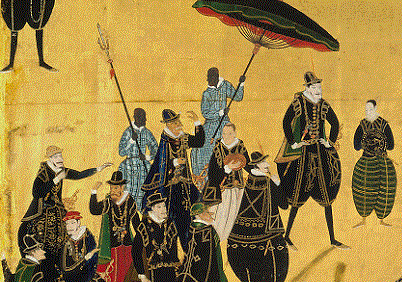
Kyoto Lectures 2018-03-14
14 MARS 18
The Jesuits and Slavery in Early Modern Japan
The system of “permits”
Speaker: Lucio de Sousa
École francaise d'Extrême-Orient (EFEO)
Scuola Italiana di Studi sull'Asia Orientale (ISEAS)
Co-hosted by Institute for Research in Humanities, Kyoto University
Wednesday, March 14th, 18:00h
Please note that this lecture will be held at the Kyoto centre of the École française d'Extrême-Orient (EFEO Kyoto)
29 Betto-cho Kitashirakawa, Sakyo-ku, Kyoto, 606-8276 Japan
Along with the ideals of Conversion and Salvation of the souls of newcomers, a strange and controversial covenant was established between the clerics and the associations of merchants of different nationalities headed by the Portuguese. This relationship was regarded as contentious at the time and remains controversial until the present day in what concerns the active conjunction between the Society of Jesus and slave trade. Along with silk trade, Chinese, Japanese, and Korean slaves were a key-product for the Portuguese in Japan. In the decades following the Portuguese settlement in Macau (ca. 1555-57), European and Asian merchants converged in this city, and through their overlapped networks slaves transited from there to various Asian, European, and American regions. A system of "permits" issued by members of the Society of Jesus in Japan and China made possible this traffic, enabling and justifying the flow of Chinese, Japanese, and Korean slaves to cities such as Lisbon, Malacca, Goa, Manila, Acapulco, Mexico City, and Lima.
Lucio de Sousa is a specially appointed Associate Professor at Tokyo University of Foreign Studies. His primary ¬field of research is the slave trade and Jewish diaspora in Asia in the Early Modern Period. A member of the Steering Committee of Global History Network and Chair of the Board of advisors of the project “Global Encounters between China and Europe: Trade Networks, Consumption and Cultural Exchanges in Macau and Marseille, 1680–1840” (GECEM), he was rewarded by the Macao Foundation, the Social Science in China Press and the Guangdong Social Sciences Association for his monograph The Early European Presence in China, Japan, The Philippines and Southeast Asia, (1555-1590) - The Life of Bartolomeu Landeiro (Macao Foundation, 2010). In 2017, he has published a book about the Japanese slaves in the Portuguese Empire (Daikokai jidai no nihonjin dorei, Chuo koron shinsha).
EFEO
TEL. 075-701-0882
Fax. 075-701-0883
Email:
efeo.kyoto@gmail.com
kyoto lectures
The system of “permits”
Speaker: Lucio de Sousa
École francaise d'Extrême-Orient (EFEO)
Scuola Italiana di Studi sull'Asia Orientale (ISEAS)
Co-hosted by Institute for Research in Humanities, Kyoto University
Wednesday, March 14th, 18:00h
Please note that this lecture will be held at the Kyoto centre of the École française d'Extrême-Orient (EFEO Kyoto)
29 Betto-cho Kitashirakawa, Sakyo-ku, Kyoto, 606-8276 Japan
Along with the ideals of Conversion and Salvation of the souls of newcomers, a strange and controversial covenant was established between the clerics and the associations of merchants of different nationalities headed by the Portuguese. This relationship was regarded as contentious at the time and remains controversial until the present day in what concerns the active conjunction between the Society of Jesus and slave trade. Along with silk trade, Chinese, Japanese, and Korean slaves were a key-product for the Portuguese in Japan. In the decades following the Portuguese settlement in Macau (ca. 1555-57), European and Asian merchants converged in this city, and through their overlapped networks slaves transited from there to various Asian, European, and American regions. A system of "permits" issued by members of the Society of Jesus in Japan and China made possible this traffic, enabling and justifying the flow of Chinese, Japanese, and Korean slaves to cities such as Lisbon, Malacca, Goa, Manila, Acapulco, Mexico City, and Lima.
Lucio de Sousa is a specially appointed Associate Professor at Tokyo University of Foreign Studies. His primary ¬field of research is the slave trade and Jewish diaspora in Asia in the Early Modern Period. A member of the Steering Committee of Global History Network and Chair of the Board of advisors of the project “Global Encounters between China and Europe: Trade Networks, Consumption and Cultural Exchanges in Macau and Marseille, 1680–1840” (GECEM), he was rewarded by the Macao Foundation, the Social Science in China Press and the Guangdong Social Sciences Association for his monograph The Early European Presence in China, Japan, The Philippines and Southeast Asia, (1555-1590) - The Life of Bartolomeu Landeiro (Macao Foundation, 2010). In 2017, he has published a book about the Japanese slaves in the Portuguese Empire (Daikokai jidai no nihonjin dorei, Chuo koron shinsha).
EFEO
TEL. 075-701-0882
Fax. 075-701-0883
Email:
efeo.kyoto@gmail.com
kyoto lectures
2025
2024
2023
2022
2021
2020
2019
2018
DÉCEMBRE NOVEMBRE OCTOBRE SEPTEMBRE AOÛT JUILLET JUIN MAI AVRIL MARS FÉVRIER JANVIER 2017
2016
2015
2014
2013
2012
2011
2010
2009
2008
anna seidel memorial lectures
architecture
bibliothèque
cahiers d'extrême-asie
chantier
chercheurs
concours
conférence
conférences
construction
inauguration
jôtôshiki
kyoto lectures
kyoto lectures
kyoto lectures
la conservation et la rénovation de l’architecture au japon
la conservation et la rénovation de l’architecture au japon
lecture series
news
nouvelles
paruations
parutions
prix
publications
visites
workshop
2024
2023
2022
2021
2020
2019
2018
DÉCEMBRE NOVEMBRE OCTOBRE SEPTEMBRE AOÛT JUILLET JUIN MAI AVRIL MARS FÉVRIER JANVIER 2017
2016
2015
2014
2013
2012
2011
2010
2009
2008
anna seidel memorial lectures
architecture
bibliothèque
cahiers d'extrême-asie
chantier
chercheurs
concours
conférence
conférences
construction
inauguration
jôtôshiki
kyoto lectures
kyoto lectures
kyoto lectures
la conservation et la rénovation de l’architecture au japon
la conservation et la rénovation de l’architecture au japon
lecture series
news
nouvelles
paruations
parutions
prix
publications
visites
workshop

